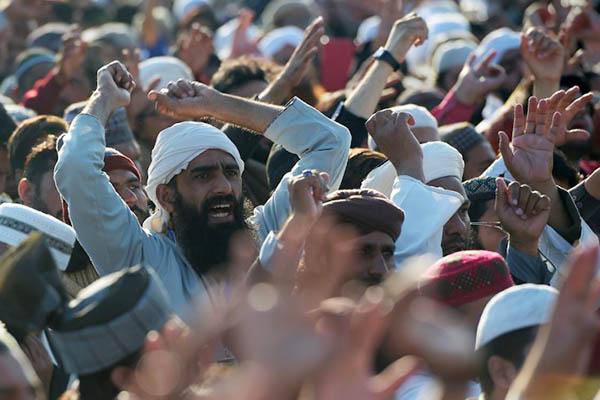
Aamir Qureshi—AFP
The ongoing sit-in in Islamabad has, once again, exposed the perils of Pakistan’s policy of appeasing nonstate actors
One spontaneous citizen’s reaction to the ongoing Tehreek-i-Labaik Ya Rasool Allah campaign against a “perceived” blaspheming law minister in Islamabad is that “the state is dead.” For over a fortnight employees have been unable to commute between Rawalpindi and Islamabad because all modes of transport remain suspended. A few thousand rustic devotees of Khadim Hussain Rizvi have blocked the roads and spend their days and nights listening to their leader’s obscene speeches.
Pakistan has come to this pass—the helplessness or absence of the state despite court orders—because of decades of policy of allowing nonstate actors to have their play outside the writ of the state. Pakistan has fought three big wars, losing all of them, and has got used to employing methods of war that erode its authority. By using religion, it has exposed itself to “acceptable” rebuke from clerics of doubtful integrity. It began by stationing foreign fighters on its soil with exemption from law, opening itself to erosion of authority.
Heroic figures of disrepute in the world were allowed to walk with authority. The madrassa, once a revered institution of Islamic teaching, was allowed to connect with them and given impunity. Unlawful exercise of clerical authority grew till the masses accepted the madrassa as an alternative to the state itself. By allowing freedom from scrutiny the state made these institutions a refuge for individuals with great ambition but no morals.
When and if the law took its normal course the courts were made to realize that the clerics could not be challenged. The government itself was scared of prosecuting them and the judges soon got the message. This immunity directly led to the criminalization of religion in Pakistan, and madrassas, funded lavishly from out of the country, became more assertive and practiced enslavement of poor disciple-students through free lodging and boarding.
Today, Labaik’s leader Rizvi defies the state while abusively driving his followers like a herd of cattle. The government is paralyzed because the state has gradually said goodbye to its internal sovereignty somewhat like Afghanistan and Somalia. Pakistan is a much larger state with a big population—but its “Islamic” nuclear bomb threatens to become a “Sunni” bomb because of the state’s decline into sectarianism.

2 comments
All that you have written is true and a matter of shame.
Our establishment has been steering us towards an abyss which is now in clear sight.
It may be too late to change course.
Why is the byline missing? The author deserves to be complimented for the incisive and bold analysis. National energies get dissipated when civil & military leadership are sucked into a cat & mouse game. Many believed that democracy is beginning to strike roots in Pakistan. But, as long as both military & civilian leadership are in the awe of mullah, that may be a distant dream.